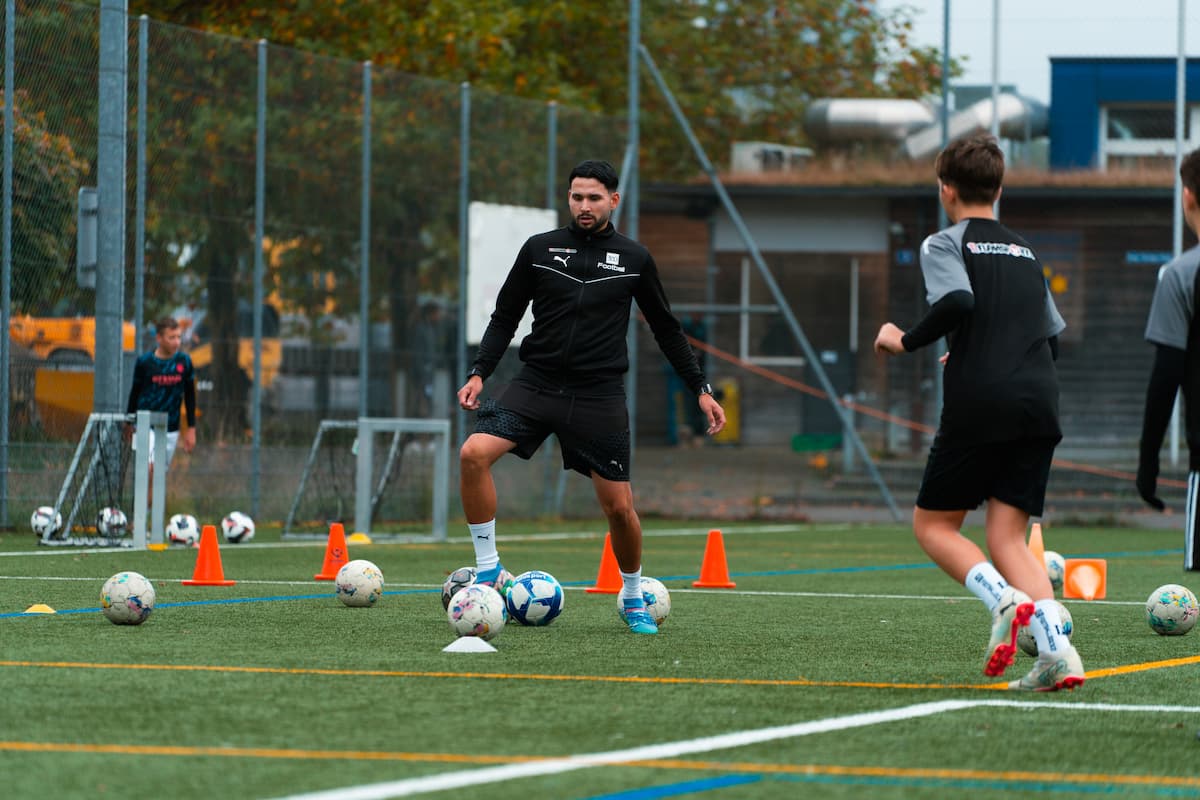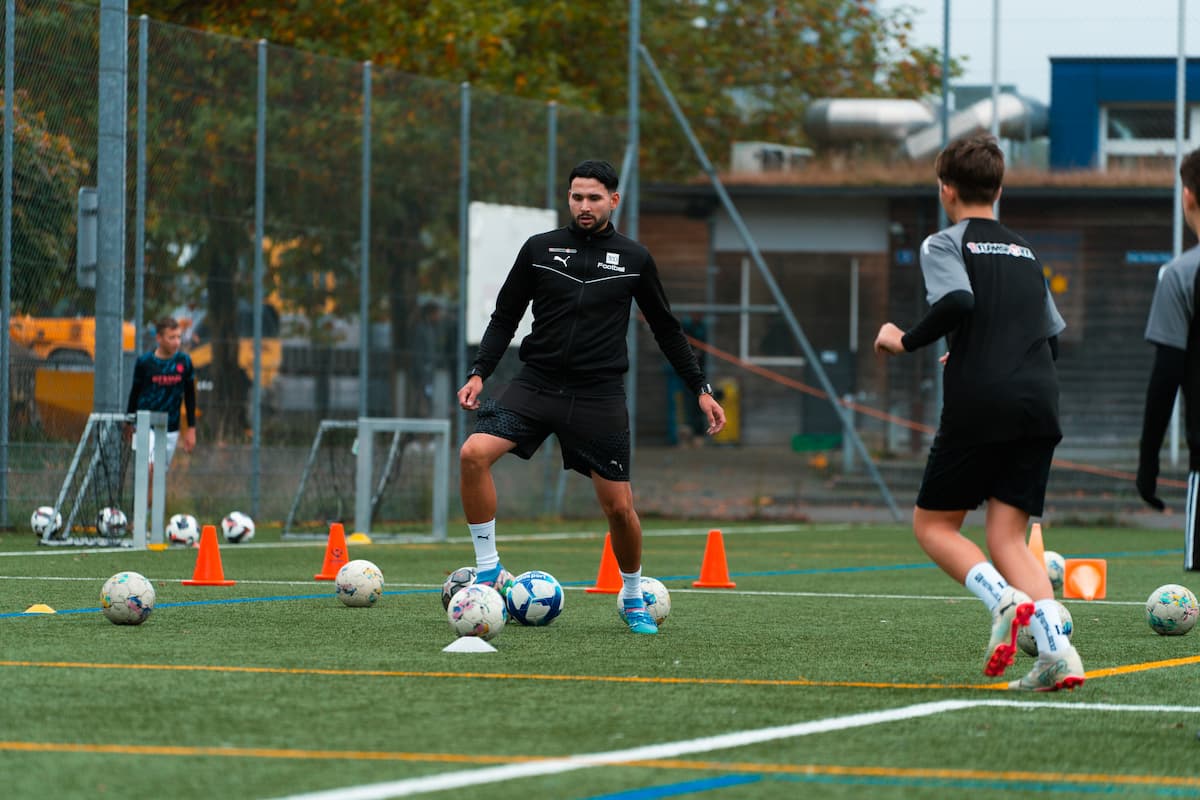Introduction
A football trial can be the first step to a successful career. It offers the opportunity to show your talent to coaches and get a place on a team. This article explains how to organize a football trial, what steps are necessary and what you should pay attention to.

What is a trial training session?
definition and objective
A football trial is a training session where players have the opportunity to demonstrate their skills in front of coaches. The aim is to get a place on the team or to prove their own playing ability.
Advantages of a trial training session
A trial training session offers several advantages:
- Assessment of one’s own abilities: Players can recognize their strengths and weaknesses.
- Network building: Contacts can be made with coaches and other players.
- Career opportunities: If you complete a trial training session successfully, you have the chance to be accepted into a team.
When does a trial training session make sense?
move to a better team
A trial training is particularly useful if you want to move to a better team. This can be the case if you think you are ready for the next step in your football career. In a better team you will be challenged more and have the opportunity to develop your skills further.
Transfer due to changes in the current club
It may also be necessary to do a trial training session in order to switch to another team if the current club is not a good fit. Reasons for this could be:
- Change of coach: The new coach doesn't rely on you.
- Team dynamics: Changes within the team that affect your position or playing time.
- Personal reasons: Changes in your personal environment that make a change of club necessary.
How to organize a trial training session
Research and selection of the right club
The first step to a football trial is choosing the right club. Various factors should be taken into account:
- Location: The club should be easily accessible.
- Level of play: The level of the team should match your own abilities.
- Coaching staff: Find out about the qualifications and experience of the coaches.
Contacting the club
Once a suitable club has been found, the next step is to contact them. This can be done by phone, email or using the contact form on the club's website. When contacting them, the following information should be provided:
- Personal data: name, age and position.
- Playing experience: Information about previous clubs and leagues.
- Goals: Reasons for the trial training and goals in football.
Submit a highlight video
A highlight video can be crucial in making a first impression with a club or coach. In this video, you should showcase your best scenes and skills - from dribbling to finishing to game overview.
At 360Football we offer the possibility of professionally editing existing video sequences or creating a new highlight video. Such videos can make the difference, especially for high-performing teams or clubs with a lot of requests.
use of various contact options
In addition to emails and contact forms, it is often helpful to look up the telephone numbers of the coaches on the Swiss Football Association website and call them directly. It is important to be convincing and to make your willingness and preparation clear. Alternatively, you can also go to training in person and speak to the coach. Creativity and different approaches can be crucial here.
Early inquiry
It is important to inquire early enough, as teams are often put together early and trial training sessions are no longer offered. Especially with competitive teams, you should check whether there are realistic chances before applying.
Preparation for the trial training
Physical Preparation
Before the trial training, thorough preparation is important:
- Fitness: Make sure you are physically fit. Your endurance should be at a high level.
- Technique: Work on your technical skills such as passing, dribbling and shooting accuracy.
- Strength: Strength training also plays an important role. You should be in top physical shape.
Mental Preparation
Prepare yourself mentally for training:
- No excuses: you have to be ready to give it your all. Prepare yourself mentally to show your best.
- Self-confidence: Be confident and dare to stand out.
- Rest before the trial training: Reduce the training volume in the days before the trial training in order to be fresh and rested on the day of training.
What you should consider during the trial training
punctuality and demeanor
Punctuality is an important aspect of the trial training. Be at the training location on time and bring the necessary equipment with you, such as football boots, training clothes and shin guards. A well-groomed and professional appearance leaves a positive first impression.
behavior and communication
During the trial training, behavior is crucial:
- Respect: Show respect to coaches, trainers and teammates.
- Communication: Be open and communicative, ask questions and accept instructions.
- Commitment: Show commitment and dedication in all practices and games.
Get feedback
After the trial training, it is helpful to get feedback from the trainers. This can be done in person or by email. The feedback provides valuable information about your own performance and areas for improvement.
After the trial training
follow-up and analysis
After the trial training, it is important to follow up thoroughly. Analyse your performance and the feedback you received. Identify areas where you can improve and work specifically on these aspects.
Further steps
If the trial training was successful and a place in the team is offered, the next steps should be planned. This includes completing the necessary formalities and integrating into the team.
If the trial training was not successful, it is important not to give up. Use the feedback to continue to improve and look for further trial training opportunities at other clubs.
Frequently Asked Questions
How do I find clubs that offer trial training sessions?
You can find clubs online, through social media or through local sports associations. Many clubs have information about trial sessions and contact details on their website.
Do I have to pay for a trial training session?
Trial sessions are usually free, but some clubs may charge a small fee to cover administrative costs.
How often can I take part in a trial training session?
This depends on the club. Some clubs only offer a one-time trial session, while others allow several sessions to get a comprehensive picture of the players.
What happens if I get injured during the trial training?
Most clubs have insurance policies that cover injuries sustained during training, but it is advisable to clarify this with the club before training and to ensure that you have health insurance yourself.
Can I prepare for a trial training session?
Yes, thorough preparation is crucial. Work on your fitness, technique and mental strength. Also find out about the club and the coaches to be well prepared. At 360Football you can also prepare yourself optimally for a football trial on the field.
Additional tips
- Get references : A recommendation from a previous trainer can be helpful.
- Personal contact : Visiting a training session to speak to the trainer shows initiative.
- Check alternatives : Digital scouting is becoming increasingly important – optimize your profile on platforms such as LinkedIn or special football portals.
- Plan for integration : If you are accepted, prepare to integrate quickly into the team.
Conclusion
A football trial is a valuable opportunity to show your skills and get a place in a team. Through careful preparation, professional behavior and targeted training, you can maximize your chances. Use the opportunity to get feedback and continuously improve in order to achieve your goals in football.


